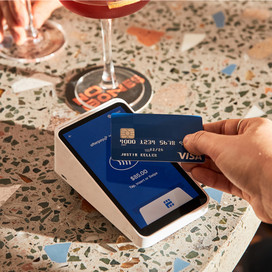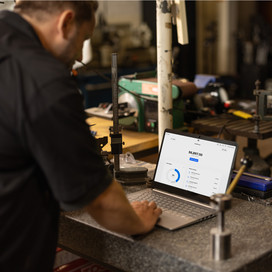Table of contents
If you’re starting up a business, then setting up a business bank account is an important part of the process. In some cases, having a dedicated bank account for your business – and not simply a personal account where you can handle company finances – is mandatory. Whatever sort of venture you’re planning, a business bank account can help make your finances much easier to manage.
In this post, we’ll provide information to help you get started, but you should seek the advice of a legal or financial expert for your specific needs.
What is a business bank account?
A business bank account works in much the same way as your personal bank account, but under the name of your enterprise rather than an individual. While not required by some types of business, business bank account benefits make them a smart choice for any company, as they make tracking profit, expenditures, tax and the general finances of your venture much easier.
Do I need a business bank account?
If you are operating as a partnership, company or trust, then you must have a separate bank account for tax purposes.
If you are operating as a sole trader, you don’t have to have a business bank account, but many traders still opt for one.
If you’re not sure if you set up your business as a partnership, company, trust or sole trader, then you can search your Australian Business Number (ABN) using the ABN Lookup to work out your entity type.
Benefits of having a business bank account
As a sole trader or small business, using your personal bank account for business finances might seem convenient. However, maintaining separate accounts for business and personal finances has several benefits.
A business bank account keeps your business earnings separate from personal money, making it easier to track your business performance. It also simplifies tax preparation and company reporting by clearly distinguishing business transactions from personal ones.
Business bank accounts typically offer lower fees for frequent business transactions, helping you save money on banking services. Some banks provide exclusive benefits for business account holders, such as access to specialised business advisors and financial management tools, to help you make informed decisions and manage your finances more effectively.
Additionally, having a business bank account can increase your eligibility for business loans and credit, providing access to funding options for growth and operational stability.
How do I open a business bank account?
Business bank accounts are offered by all of the big four banks and most of the smaller ones. For your own convenience, you can open a business bank account with your current bank, but this is by no means necessary, and you may even save money by looking elsewhere.
To make a business bank account application, you’ll typically need to provide the following:
- Proof of identity (such as your passport, driver’s licence or Proof of Age card), or two non-photographic forms of identification (such as your birth certificate and Medicare card)
- Proof of address (such as a utility bill or bank statement)
- Business name (as registered with the Australian Securities and Investments Commission (ASIC))
- Business address (where your business is registered)
- The nature of your business
- ABN, Australian Company Number (ACN) and tax file number (TFN), if applicable
These requirements vary depending on the bank and your business entity type, so it’s best to check the bank’s website or contact them to find out exactly what documents you have to provide.
If you have a poor credit history, then you are less likely to be accepted for a business bank account, and banks may enquire about your personal finances before granting any business banking services to you.
Who can open a business bank account in Australia?
To open a business bank account in Australia, it’s ideal to be an Australian resident with a clean credit rating, which significantly improves your chances of being accepted by providers.
If your business has a representative based in Australia, such as a partner in a partnership, you can still apply for an Australian business bank account. This arrangement can help simplify the application process, even if you yourself aren’t an Australian resident.
While it’s possible for international residents to open a business bank account in Australia, expect more administrative steps. Banks are cautious about fraud, so you’ll likely need to provide additional documentation and undergo more checks.
Can a business bank account be opened online?
Banks often allow you to open a business bank account online, depending on your type of business. For example, if you’re a sole trader, it’s much easier. In other cases, banks require you to take your documents into a branch in person before granting you access to a business account.
Depending on the bank, you may be able to make an appointment at your local branch via the bank’s website. You will be required to provide the documents listed above and may be asked for further details about your business.
Charges and fees of business bank accounts
Traditional banks typically offer various business bank account options tailored to different business needs.
No monthly fee business bank accounts
No monthly fee accounts are ideal for businesses with fewer in-person transactions and more digital activity. While these accounts do not charge a monthly fee, there are fees for staff-assisted transactions, cheque deposits or other non-digital banking services. These fees can be a fixed amount or a percentage of the transaction.
Low monthly fee business bank accounts
Accounts with a small monthly fee typically offer comprehensive services and reduced transaction fees. They’re suited to businesses with a higher volume of transactions or those requiring regular in-person assistance. These accounts often include a set number of free transactions and access to features like dedicated business support and overdraft facilities.
Business bank accounts usually include access to internet banking and a banking app, a business debit card, integration with accounting software and fraud protection for unauthorised transactions. Banks may also offer additional benefits such as free ATM transactions, free international transfer fees, fee rebates, free business insight tools, or discounts with partner companies.
These offerings vary widely between banks, so it’s important to assess your needs and compare offerings to select an account that suits your financial management style and business operations.
The best business bank accounts in Australia
When it comes to finding the best bank for business accounts, the big four banks are the most commonly used providers, but they vary in their fees and offerings.
Below is a summary of what you can expect from the big four banks, helping you pick the best bank for your business needs.
Offerings listed below are current as of 8 July 2024 and are subject to change. Please visit individual bank websites for up-to-date pricing and information.
| Bank | Account | Monthly fee | Offers |
| CBA | Business Transaction Account – Online | $0 | Option to switch between Online and In Branch any time |
| Business Transaction Account – In Branch | $10 | 5 monthly assisted transactions; option to switch between Online and In Branch any time | |
| NAB | Business Everyday Account | $0 | |
| Business Everyday Account | $10 | 30 monthly assisted transactions | |
| ANZ | ANZ Business Essentials | $0 | |
| ANZ Business Extra | $10 | 20 monthly assisted transactions; higher payment limits; optional draft facility | |
| Westpac | Business One | $0 | |
| Business One Plus | $10 | 25 monthly assisted transactions; pair with business savings account to earn interest |
Commonwealth Bank of Australia (CBA)
CommBank offers a Business Transaction Account with two options. The popular Online option is well suited to sole traders and small businesses that bank mostly online. It comes with no monthly fee, but you’ll pay $5 per staff-assisted transaction or $10 per deposit in a branch.
The In Branch option is more suitable for businesses that bank regularly in a branch or at a post office. There’s a $10 monthly fee, which includes five free staff-assisted transactions. After that, you’ll be charged $5 per staff-assisted transaction or $10 per in-branch deposit.
If you’re unsure how you’ll do your banking, CommBank offers the unique ability for you to switch between these options anytime via internet banking or the app. This Business Transaction Account can also be paired with a Business Online Saver account at no additional cost, which gives you the opportunity to earn interest on your full balance.
National Australia Bank (NAB)
NAB offers two transaction accounts, each with different fee structures. The Business Everyday Account is suited to sole traders who make a low number of transactions and mainly transact online. There’s no monthly fee, but you’ll be charged $2.50 per staff-assisted assisted transaction and $0.60 per cheque transaction.
NAB’s other Business Everyday Account has a $10 monthly fee and is designed for businesses that make a high number of online and assisted transactions. You can make 30 free assisted transactions per month, which gives you greater certainty of costs.
Australia and New Zealand Banking Group (ANZ)
ANZ also offers two transaction accounts. The first, ANZ Business Essentials, is a simple business account with no monthly flat fee, ideal for sole traders or single director companies. You’ll be charged $2.50 for staff-assisted transactions, cheque transactions and manual deposits.
ANZ’s other option, ANZ Business Extra, offers greater flexibility and control through ANZ Internet Banking for Business (IB4B), which allows for higher daily payment limits, multiple access levels and co-signatory authorisation. There is a $10 monthly fee, which includes 20 free monthly assisted transactions and an optional overdraft facility to help with your short-term cash flow.
Westpac
Westpac has two business transaction accounts, each suited to different kinds of businesses. The Business One is best for start-ups and small businesses that mainly transact electronically. There is no monthly account fee, but you’ll be charged $3 per staff-assisted transaction.
If you’re a larger or more complex business, occasionally bank in a branch or require an overdraft facility, you might want to consider the Business One Plus. There is a $10 monthly fee, which allows you to make 25 free monthly assisted transactions. After that, you’ll be charged $3 per assisted transaction. Opening this account along with a Business Cash Reserve savings account gives you the added opportunity to receive a bonus interest rate on your savings account for the first 12 months for balances up to $30,000.
Linking your business bank account and setting up transfers with Square
Once you have your business bank account, it’s simple to link it to your Square account and begin receiving funds instantly or the next day.
Square will need to verify your account before money can be transferred; however, you can still accept payments – these will be securely stored in your Square balance.
To add your bank account to Square:
- Sign in to your Square account. On your Square dashboard, go to Account & Settings. From there, click Business Information > Bank Accounts > Add External Bank Account.
- Enter the account holder’s full name, account number and the Bank-State-Branch (BSB) number of your preferred bank account. Please check your internet banking system or a recent bank statement for your BSB and account number.
- Check your information is correct and click Verify.
- Square will verify your account and complete the process; this can take up to five business days.
Following your account being verified by Square, you can have payments transferred straight to your account. Square’s transfer schedule sends payments to your linked bank account each evening, including Friday to Sunday, and the funds will arrive the following day. Alternatively, you can manually decide when to transfer your money, or opt for instant transfers to receive the money immediately.
You can change your Close of Day time in your Square Dashboard to better reflect your trading hours; this allows Square to group the transactions of the past 24 hours into one transfer and is especially useful for businesses trading after midnight.
For further information on transfers and linked account settings, visit our Support Centre.
Once you’re all set up with your business bank account, check out Square POS for your business. With our point-of-sale system, you can easily accept card payments, gain powerful sales insights and manage your team efficiently in an all-in-one solution. Learn more about Square POS.
![]()














